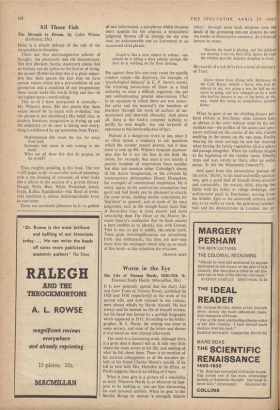All Those Fish
The Strength to Dream. By Colin Wilson. (Gollancz, 25s.) HERE is a simple defence of the role of the imagination in literature.
There are two anti-imaginative schools of thought: the pessimistic and the documentary. The first (Beckett, Sartre, Andreyev) claims that no fantasy can do justice to the horror of living; the second (Robbe-Grillet) that it is plain subjec- tive lies. Both ignore the fact that we have certain values which are a pre-condition of our perception and a condition of our imagination; these values make life worth living and lies—in the highest sense—worth telling.
This is—if I have interpreted it correctly— Mr. Wilson's thesis. (He also pleads that these values should be 'in touch with evolution,' but the phrase is not elucidated.) His belief that, in modern literature, imagination is drying up and the subjective cri de cmur is taking over every- thing is reinforced by apt quotation from Yeats:
Shakespearean fish swam the sea, far away from land;
Romantic fish swam in nets coming to the hand;
What are all those fish that lie gasping on the strand?
That, roughly speaking, is this book. The rest —228 pages in all—is acre after acre of summary, with a top dressing of comment, of what looks like a job-lot in the auction of a private library. Waugh, Wells, West, Wilde, Wedekind, James, Joyce, Kafka, Kazantzakis—this flood of irrele- vant erudition is almost indistinguishable from its own index.
There are incidental pleasures in it—a gobbet of new information, a paraphrase which sharpens one's appetite for the original, a sympathetic judgment thrown off in passing (in my own case, an unfavourable one on Lawrence) or an occasional vivid phrase: Gogol is like a man subject to asthma: one minute he is telling a story soberly enough, the next he is writhing on the floor choking.
But against these hits one must count the equally random misses—the discovery, for example, of 'psychological delicacy' in C. P. Snow's novels, the irritating invocations of Shaw as a final authority to close a difficult argument, the pat and unilluminating general observations ('Art is an equation in which there are two terms: the artist and his material'), the boredom of journeys through the work of authors of un- questioned and deserved obscurity. And above all, there is the book's complete inability to justify its own length: but one ha'porth of argument to this intolerable deal of fact.
Naïveté is a dangerous word to use, since it so often means a tendency to ask questions which the accuser cannot answer; but it does seem to sum up Mr. Wilson's frequent unaware- ness that he is not the first in the field. He insists, for example, that man is not merely a passive recipient of impressions from outside; but does not mention either Coleridge's theory of the Active Imagination, or the criticism by contemporary philosophers (Stuart Hampshire, for example) of conventional empiricism. He is naïve, again, in his omnivorous assumption that good and bad books can be discussed in exactly the same terms, yielding similar conclusions for 'literature' in general; and in some of his snap judgments, such as the straight-faced claim that A Burnt-Out Case is more sincere and more convincing than The Heart of the Matter, be- cause Querry's confession that he finds success a bore enables us to identify him with Greene. That is not, to put it mildly, the .whole truth. These giant oversimplifications are attractively fresh and enthusiastic, but they are not—any more than the catalogues which take up so much of this book—a fair substitute for criticism. FRANCIS HOPE














































 Previous page
Previous page